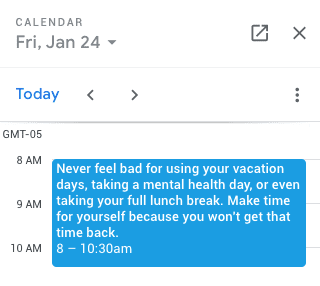Dealing With Stress at Work: A How-To
June 03, 2020 by Kate Levy
Work can be stressful as it is. Factor in a worldwide public health crisis, struggling economy, job losses, salary cuts, shelter in place orders, new working environments, and protests – and we have a recipe for record high stress levels.
So, what can we do when we feel like the world is imploding, and how can we ease those worries so as not to bring them into our work environments?
In this article, we’ll go through a few ways that you can reduce your at-work stress levels. These tips are all aimed at the individual level – you reading this – however, they can also be applied by HR leaders to help their staff members through these stressful times.
Let’s jump right in.
Mindfulness: How to Stay Present
We’ve all heard of mindfulness, but what are actionable ways to stay present during the workday?
One simple step you can take is to tune into your senses for a minute each hour or so. Bringing yourself into the present moment helps to fade any anxious thoughts or worries into the background, allowing you to focus on the task at hand.
“Two skills define a mindful mind: focus and awareness. More explicitly, focus is the ability to concentrate on what you’re doing in the moment, while awareness is the ability to recognize and release unnecessary distractions as they arise,” writes UC Berkeley.
“Understand that mindfulness is not just a sedentary practice; mindfulness is about developing a sharp, clear mind.”
Another thing we can do is to avoid multitasking.
While some may see it as a strength, multitasking is actually highly unproductive for most people and can even be harmful to your mental health, leading to burnout. Shifting your attention back and forth between unrelated responsibilities can stretch us too thin and lead to mistakes.
“Research indicates that multitaskers are actually less likely to be productive, yet they feel more emotionally satisfied with their work, thus creating an illusion of productivity,” says Inc.
Creating a to-do list and checking items off is the best way to avoid multitasking and it feels good, too. Breaking a daunting project into smaller tasks can ease the overwhelming feeling we sometimes get. And looking back to see everything you were able to accomplish feels like a small victory.
Another change you can make is to shift to a growth mindset. “Individuals who believe their talents can be developed (through hard work, good strategies, and input from others) have a growth mindset,” explains Harvard Business Review.
“They tend to achieve more than those with a more fixed mindset (those who believe their talents are innate gifts). This is because they worry less about looking smart and they put more energy into learning. When entire companies embrace a growth mindset, their employees report feeling far more empowered and committed; they also receive far greater organizational support for collaboration and innovation.”
Although it may be especially difficult right now, staying positive can not only have a positive impact on your outlook, but it can also rub off on your coworkers. For example, perhaps choose not to share the bad news you just heard. Share the simple pleasures of your day and what you’re looking forward to. Everyone around you will appreciate your positive perspectives.
Seek the support of your colleagues, too. Use the common ground we all share right now to connect with them. Make an attempt, if you’re working from home, to stay in the loop with what’s going on in your work friends’ lives. Whether it be staying on a call a little longer to chat and catch up or schedule a Zoom chat, make sure you make time for those ‘out-of-work’ work conversations.
Self-care (In and Out of Work)
During this time, it might feel like it’s easy for our worries to bubble over. Things that normally don’t bother us too much have the ability to push us over the edge because the world feels so hectic right now. This can affect us in unforeseen ways that we may not even be conscious of.
One way to cope with this is through self-care. Think about things that center you and make you feel like you. Whether it be cooking, gardening, yoga, or video chatting with your family, make sure you make room for yourself to spend time doing what matters to you outside of work.
There are also ways to self-care at work. Take breaks, go for a walk during lunch, socialize with your coworkers, organize your desktop, grab some coffee, clean up your desk area. Try to take notice of the small things you do throughout your day that spark a little joy.
Speaking of taking breaks, take a break from the news. News overload can be upsetting, so stay in the loop in less draining ways like listening to podcasts, such as The Daily or The Gist, and reading daily newsletters like The Skimm.
Not only are we at risk of overloading on news coverage, we can be damaged by information overload. According to David J. Levin, author of the Organized Mind: Thinking Straight in the Age of Information Overload, the mind can only focus on a couple things at once.
“If you get much beyond that, you begin to exercise poorer judgment, you lose track of things and you lose your focus,” he explains. In a way, overdoing the news and paying too much attention to the vast amount of information flooding in at all times, you end up basically multitasking at all times, which can be stressful and unproductive as we mentioned above.
According to a LinkedIn Learning study, most professionals think of self-care as learning and self-improvement. The majority of them also reported that they are less likely to feel burnout when learning and growing in their role.
Don’t Be So Hard on Yourself or Others
We all have days where we don’t feel like our best selves. We feel slightly unproductive, unprepared, or overwhelmed. Try not to be so hard on yourself — remember tomorrow is a new day and aim not to let your difficult day set you back.
Also remember that you have a PTO policy. Give yourself permission to take time off for yourself, even if you don’t have a reason. Although it’s difficult to use up your vacation days on a staycation, that time is there for you and you should take it!
You should also apply this to others as well. Everyone is going through a heightened level of stress right now. It’s important to be empathetic to these situations and understand that people might need a bit more space than usual.
Work-Life Balance
Speaking of self-care and PTO policies, you should attempt to have a clear work-life balance right now. While working from home, it can be difficult to draw the lines between your “at home” and “at work” self, which can cause some to over work themselves and not have proper boundaries in place.
According to HBR, “research suggests that drawing lines between our professional and personal lives is crucial, especially for our mental health. But it’s difficult, even in the best of circumstances”
To start, structure your work day and create a schedule. Have set times that you will be working and mimic your usual work day. If you work 9-5, replicate that schedule at home. I mark the beginning and end of my work day by switching on and off my “away” status on Slack.
And at the end of the day, wrap-up by setting your to-do list for tomorrow, instead of cramming work in at the very end of the day.
Set boundaries. Try not to send and respond to work-related emails outside of working hours. It can be damaging to be available 24/7 and this can certainly lead to high stress levels and less spare time.
Also set boundaries with those you live with. When my door is closed, my partner knows that I’m busy or in a meeting. If you don’t have an office door, make sure you have clear communication with your roommates, partners and children about when it is acceptable to get your attention.
Distractions not only impact your productivity; they harm the overall quality of your work.
According to Psychological Science, “research has shown that distractions cause people to take longer to complete a task, but now a team of psychological scientists from George Mason University has found that interruptions don’t just take up time, they also degrade the overall quality of people’s work.”
What Can Managers Do?
While all of this has been aimed at the personal level, these tips can easily be used by managers to help their staff members reduce their stress and protect their mental health.
Managers should offer support and have open conversations about how their teams are really doing. This can be both relieving and enlightening for everyone.
Managers can also implement some activities to keep up the morale of their team. Anonymous compliment surveys, funniest moments brackets, and company quizzes are all fun ideas to execute.
Happy hours held over Zoom are a good way to unwind and connect with your coworkers who you might not be seeing as much. Pick a conversion starter like “wear your ugliest shirt” or “funniest memory from high school.”
To read more about keeping up employee morale remotely, check out our recent blog.
Wrap-Up
Times are tough but there are actions you can take in and out of work to keep your stress levels in check.
- Be mindful and practice simple mindfulness techniques periodically throughout the day. Give it a shot again or make it part of your routine.
- Don’t multitask. Prioritize your most important work over the most immediate work. Make a checklist.
- Strive for a growth mindset – understand that your success comes from your willingness to learn and grow, not from your natural talents.
- Seek the support of your colleagues and leaders. Keep an open door and keep your conversations open.
- Care for yourself in and out of work with daily “rituals” and that are simple and organizing your workspace or desktop.
- Limit your news intake.
- Don’t let a bad day get the best of you, but realize that it’s okay if it does.
- Take time off if even just to relax at home.
- Keep work and life balanced and remember that balance is achieved over time, not on a daily basis.
There’s a lot we don’t have control over right now, and there’s a lot of uncertainty and stress in all of our lives. But it’s important to remember the things we can do to manage our worries.
More from Careerminds
In need of outplacement assistance?
At Careerminds, we care about people first. That’s why we offer personalized talent management solutions for every level at lower costs, globally.



